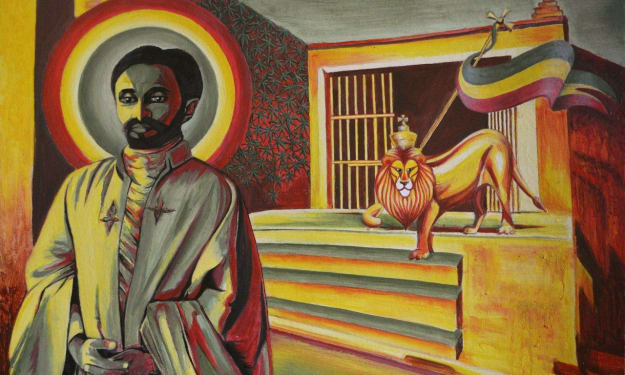The Spiritual Practices of Bobo Ashanti: A Journey into Rastafarianism
Discovering the Path to Inner Peace and Spiritual Growth through Bobo Ashanti's Sacred Traditions

Rastafarianism is a spiritual movement that originated in Jamaica in the early 20th century. One of the most prominent Rastafarian sects is the Bobo Ashanti, known for their strict adherence to traditional Rastafarian practices and rituals. Bobo Ashanti places great emphasis on spiritual practices as a means of connecting with the divine and attaining inner peace.
In this post, we will explore the spiritual practices of Bobo Ashanti and their significance in Rastafarianism. From the Ital diet to meditation, prayer, music, chanting, and scripture, we will delve into the various practices that make up Bobo Ashanti's spiritual tradition. Whether you are new to Rastafarianism or simply curious about Bobo Ashanti's spiritual practices, this post will provide a comprehensive guide to help you better understand and incorporate these practices into your own spiritual journey.
Ital diet
The Ital diet is a crucial aspect of Rastafarianism and is followed by many Rastafarians, including the Bobo Ashanti sect. It is a plant-based diet that emphasizes natural, whole foods and prohibits the consumption of meat, dairy, and processed foods. In this section, we will explore the definition and benefits of the Ital diet, as well as some common foods and recipes that are part of this dietary practice.
The word "Ital" is derived from the word "vital," and it refers to the idea of living in harmony with nature and consuming foods that are fresh and unprocessed. The Ital diet is often described as a "clean" diet, as it emphasizes the consumption of whole, plant-based foods that are high in nutrients and fiber. The diet typically includes fruits, vegetables, whole grains, legumes, nuts, and seeds.
One of the primary benefits of the Ital diet is its impact on physical health. By consuming whole, plant-based foods, the body receives a wealth of essential vitamins, minerals, and other nutrients that help to maintain optimal health. Additionally, the lack of processed foods and meat can reduce the risk of developing chronic diseases such as heart disease, diabetes, and certain types of cancer.
But the benefits of the Ital diet go beyond physical health; it is also believed to have spiritual benefits. Rastafarians see the consumption of natural, unprocessed foods as a way of staying connected to the earth and maintaining a pure, uncorrupted body and mind. It is believed that by consuming whole, plant-based foods, individuals can achieve a higher level of consciousness and spiritual enlightenment.
Some common foods in the Ital diet include fruits and vegetables, such as sweet potatoes, plantains, yams, cassava, and ackee. Other staples include beans, lentils, peas, and grains like brown rice, quinoa, and millet. Nuts and seeds such as almonds, cashews, and sesame seeds are also commonly consumed. Ital cooking methods typically involve steaming, baking, or roasting, and are often seasoned with natural herbs and spices.
Incorporating the Ital diet into daily life can be done gradually. Starting by incorporating more fruits, vegetables, and whole grains into your meals, and reducing the consumption of meat, dairy, and processed foods. With time, you can experiment with different plant-based foods and try out new recipes.
Meditation and prayer
Meditation and prayer are central to the spiritual practices of Bobo Ashanti and Rastafarianism in general. These practices are believed to help individuals achieve a higher level of consciousness and connect with the divine. In this section, we will explore the role of meditation and prayer in Rastafarianism, techniques for practicing them, and their benefits for spiritual growth and inner peace.
Meditation is a practice that involves focusing the mind on a specific object or thought, and allowing the mind to become still and calm. In Rastafarianism, meditation is seen as a way to connect with the divine and to achieve inner peace. Techniques for meditation in Bobo Ashanti include breathing exercises, visualization, and chanting mantras. Some Rastafarians also incorporate the use of cannabis into their meditation practice, as it is believed to help facilitate a deeper connection with the divine.
Prayer is another essential aspect of Rastafarian spiritual practice. It involves communicating with the divine, expressing gratitude, and asking for guidance and blessings. In Bobo Ashanti, prayer is often done in a group setting, with the use of music and chanting. The act of coming together in prayer is seen as a way of strengthening the community and creating a collective consciousness.
The benefits of meditation and prayer for spiritual growth and inner peace are numerous. Practicing meditation and prayer can help to reduce stress and anxiety, improve concentration and focus, and increase feelings of gratitude and compassion. It is also believed to deepen one's connection with the divine and enhance spiritual awareness.
In Rastafarianism, prayer is often accompanied by the use of specific mantras and chants. One common example is the "Nyabinghi chant," which is used in group prayer sessions and is believed to call forth the divine presence. Other examples include the "Jah Rastafari" chant, which expresses devotion to the divine, and the "Livity" chant, which emphasizes the importance of living in harmony with nature.
Music and chanting
Meditation and prayer are central to the spiritual practices of Bobo Ashanti and Rastafarianism in general. These practices are believed to help individuals achieve a higher level of consciousness and connect with the divine. In this section, we will explore the role of meditation and prayer in Rastafarianism, techniques for practicing them, and their benefits for spiritual growth and inner peace.
Meditation is a practice that involves focusing the mind on a specific object or thought, and allowing the mind to become still and calm. In Rastafarianism, meditation is seen as a way to connect with the divine and to achieve inner peace. Techniques for meditation in Bobo Ashanti include breathing exercises, visualization, and chanting mantras. Some Rastafarians also incorporate the use of cannabis into their meditation practice, as it is believed to help facilitate a deeper connection with the divine.
Prayer is another essential aspect of Rastafarian spiritual practice. It involves communicating with the divine, expressing gratitude, and asking for guidance and blessings. In Bobo Ashanti, prayer is often done in a group setting, with the use of music and chanting. The act of coming together in prayer is seen as a way of strengthening the community and creating a collective consciousness.
The benefits of meditation and prayer for spiritual growth and inner peace are numerous. Practicing meditation and prayer can help to reduce stress and anxiety, improve concentration and focus, and increase feelings of gratitude and compassion. It is also believed to deepen one's connection with the divine and enhance spiritual awareness.
In Rastafarianism, prayer is often accompanied by the use of specific mantras and chants. One common example is the "Nyabinghi chant," which is used in group prayer sessions and is believed to call forth the divine presence. Other examples include the "Jah Rastafari" chant, which expresses devotion to the divine, and the "Livity" chant, which emphasizes the importance of living in harmony with nature.
Reading and studying scripture
Reading and studying scripture is a vital part of Bobo Ashanti's spiritual practices and is considered essential for spiritual growth and understanding. In this section, we will explore Rastafarian scripture and literature, the importance of reading and studying scripture, examples of key Rastafarian texts, and tips for incorporating scripture study into daily life.
Rastafarian scripture and literature include a range of texts and writings that are considered sacred and authoritative. These include the Bible, specifically the Old Testament, as well as the Ethiopian Orthodox Bible and the Kebra Nagast. Other important texts include the speeches and writings of Haile Selassie I, Marcus Garvey, and Leonard Howell, among others. These texts form the foundation of Rastafarian belief and practice and provide guidance and inspiration for the community.
Reading and studying scripture is an important aspect of Bobo Ashanti's spiritual practices because it helps individuals to deepen their understanding of Rastafarianism and the divine. It is believed that through reading and studying scripture, individuals can gain wisdom, insight, and inspiration, and can develop a stronger connection with the divine. Scripture study also helps to reinforce the values and principles of Rastafarianism, such as the importance of social justice, community, and reverence for nature.
Key Rastafarian texts and their significance include the Bible, which is seen as the authoritative word of God, and the Kebra Nagast, which tells the story of the Queen of Sheba and her relationship with King Solomon. The speeches and writings of Haile Selassie I are also highly regarded, as he is considered by Rastafarians to be a messiah and a prophet.
Incorporating scripture study into daily life can be done in a variety of ways. Some tips include setting aside time each day for reading and reflection, joining a study group or community, and using resources such as study guides and commentaries to deepen understanding. It is also important to approach scripture study with an open and receptive mindset, and to be willing to engage with challenging ideas and perspectives.
Conclusion
In this post, we have explored the spiritual practices of Bobo Ashanti, a branch of Rastafarianism that places a strong emphasis on spiritual growth and understanding. We have covered three key practices: the Ital diet, meditation and prayer, and reading and studying scripture.
The Ital diet emphasizes natural, whole foods and has numerous benefits for both physical and spiritual health. Meditation and prayer are vital practices for connecting with the divine and achieving inner peace and clarity. Finally, reading and studying scripture are essential for developing a deeper understanding of Rastafarianism and the divine.
Bobo Ashanti's spiritual practices reflect the importance of mindfulness, connection with nature, and community in Rastafarianism. These practices offer a powerful way to cultivate spiritual growth and deepen one's understanding of the world and the divine.
As readers, we can incorporate these practices into our own lives by exploring Rastafarian literature, experimenting with natural and whole foods, and setting aside time for meditation and prayer. By doing so, we can deepen our connection with the divine, cultivate inner peace and mindfulness, and foster a greater sense of community and connection with the world around us.
In conclusion, the spiritual practices of Bobo Ashanti offer a rich and powerful tradition for deepening our spiritual understanding and connection with the divine. By incorporating these practices into our own lives, we can experience the benefits of mindfulness, community, and reverence for nature that are central to Rastafarianism.
Final Note
If you’re interested in exploring who is Jah further, we invite you to check out Fifth Degree’s collection of Rastafarian clothing. Our clothing is designed to reflect the spirit and teachings of Rastafarianism, with bold colors, empowering messages, and a commitment to sustainability and ethical production. We believe that what you wear can be a powerful expression of your values and beliefs, and we’re proud to offer a range of high-quality, stylish, and socially conscious clothing for individuals who are seeking to live in harmony with nature and the divine. Visit our website today to learn more about our collection and find the perfect Rastafarian clothes for woman for you.
About the Creator
Enjoyed the story? Support the Creator.
Subscribe for free to receive all their stories in your feed. You could also pledge your support or give them a one-off tip, letting them know you appreciate their work.






Comments
There are no comments for this story
Be the first to respond and start the conversation.